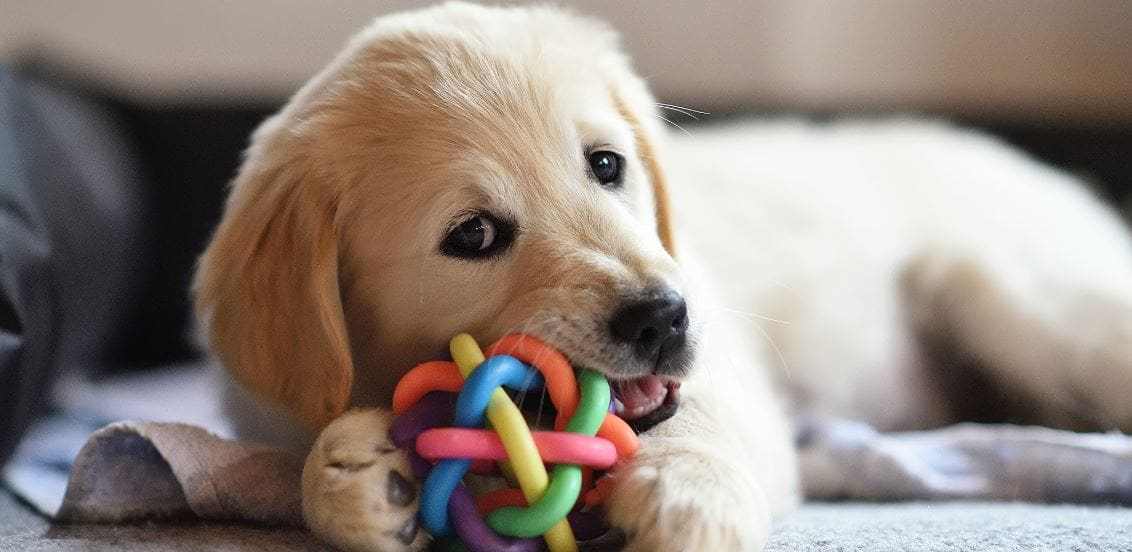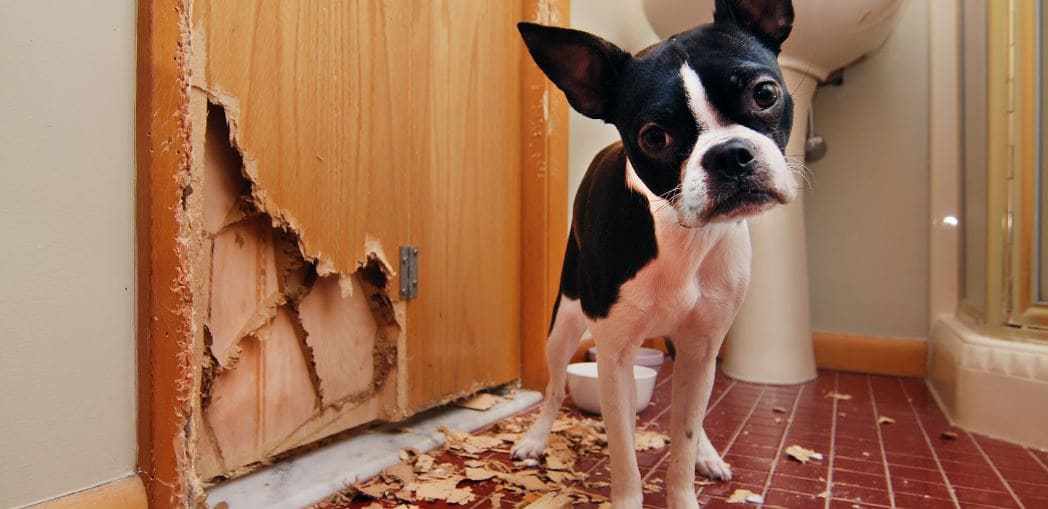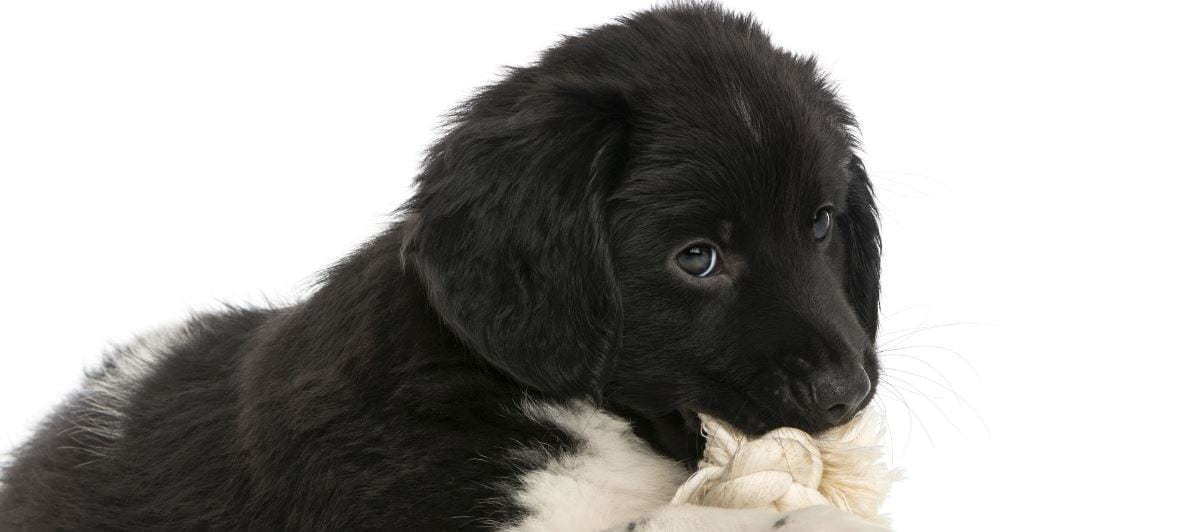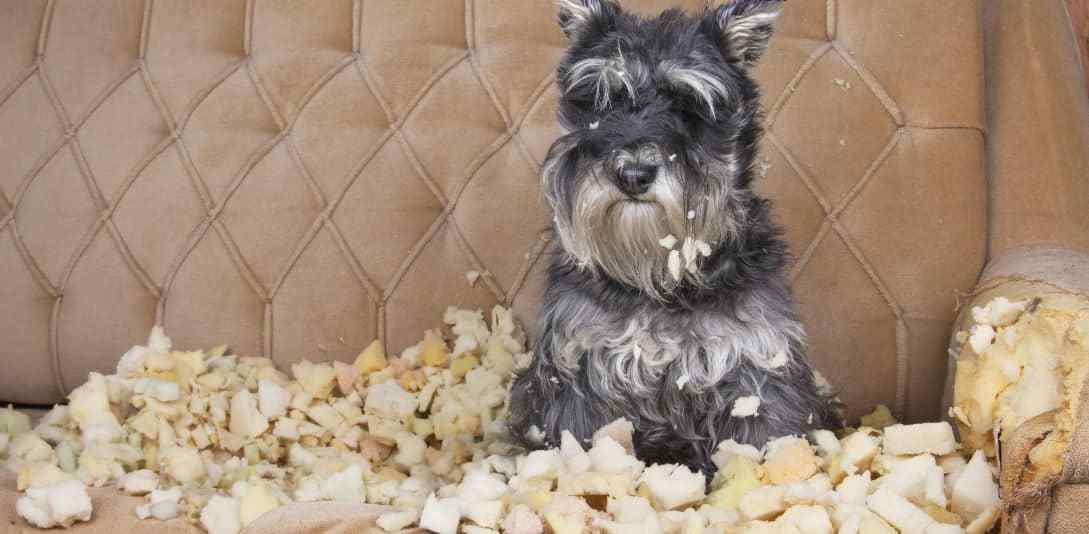Puppies love chewing on everything in sight. Just like human babies, they learn by putting different objects in their mouth; understanding what to eat and not to eat. For some new pet owners, their puppy may only gnaw on furniture or shoes for a few weeks; however, not all puppies grow out of this crazy dog chewing stage.
While puppies are little bundles of joy and cuteness, they can be destructive when they attack the legs of your new wooden table. This costs you more money to fix it when you could be using that money on pet insurance to keep your pup safe and healthy. Dog insurance is available for all dogs, even the most insane chewers.
So, why do dogs chew on everything, and is there an easy solution?
Teething
 The most common reason for dog chewing is due to teething. Your pup will endure teething until they’re six months old and their adult teeth develop. Until then, your puppy may want to put items in their mouth to help soothe their pain.
The most common reason for dog chewing is due to teething. Your pup will endure teething until they’re six months old and their adult teeth develop. Until then, your puppy may want to put items in their mouth to help soothe their pain.
Puppies experience teething when their teeth are beginning the transition from baby to adult teeth. The gums become sore and your furry friend will chew on anything within reach to soothe their sore gums.
The best way to avoid this is by providing your dog with an abundance of different dog chew toys. This will occupy their time instead of chewing on your husband’s briefcase or your son’s Jordans.
Rubber toys are one of the best options to soothe sore gums. We recommend springing for the BarkBox, which offers a variety of different toys to keep your pup entertained and away from something they shouldn’t be chewing on. We suggest a trial and error process to decide which chew toys work best for your little pal. For example, some dogs like Nylabones, while others couldn’t be more disinterested.
Hormonal Changes
 We have some great news. Once your pup is done with teething, they won’t chew on anything else ever again! Sorry, that’s actually not true at all.
We have some great news. Once your pup is done with teething, they won’t chew on anything else ever again! Sorry, that’s actually not true at all.
Before getting a puppy, you have to be patient because teaching good behaviors doesn’t just happen overnight.
After your doggo has finished teething, they’ll likely encounter hormonal changes before they turn one year old. The hormonal changes cause your dog to become more hyper and rowdy.
This leads to, you guessed it, more dog chewing! This signifies the most important part of your parental dog training: punishment and reward. Dog parents need to practice positive reinforcement for good chewing behavior. If your pup chews on their toys, shower them with affection and pet them insistently. If they begin to chew on their paws or furniture, give them a toy instead.
Allergies are common with dogs and can even lead to them biting their paws and feet. Discover if seasonal allergens could be to blame
Chewing on Paws
 That begs the question, why do dogs chew on their paws?
That begs the question, why do dogs chew on their paws?
I often hear my friends asking why their dog is constantly chewing on their paws and feet, but they don’t know why. Their dog is out of its teething and hormonal phase yet they continue to chew on their feet when lounging around the house.
Dogs chew on their paws for an entirely different reason, allergies. Just like us humans, dogs also experience allergies and it can cause them to chew on their paws.
However, allergies aren’t the only reason. Have you ever been stressed and began to bite your nails? Dogs do the same thing.
When dogs chew on their nails or paws they’re trying to cope with mental stress and anxiety in their life. This can be the product of a stressful home or simply just out of pure boredom on the dog’s side. If your dog has separation anxiety, they may lick or nibble on their feet until you return.
No matter what the reason, it is not normal for dogs to excessively chew on their paws. If you see this happening with your pooch, they might have severe allergies that need to be treated. Pet insurance reimburses you for this issue and provides peace of mind with a free quote!
Dog Chewing Symptoms
The signs can seem pretty obvious for this; if you see your dog chewing their feet, they probably have chewing issues. However, most pups are more mischievous than they look. Dogs often hide their chewing from their owner and will only chew when they’re left alone. This may force you to close doors, put away shoes, or even crate your dog while you’re away.
Dogs chew their paws out of boredom and anxiety; especially when the owner isn’t in the room. It’s your job as a new dog parent to provide them with the toys they need to alleviate this stored up energy.
Anxiety can arise in a dog’s mind when they’re alone. Will my owner ever return? How long until I can see them again? Why did they leave me?
All of these questions can run through a pup’s mind, which can lead to stress, anxiety, and boredom. If you see your pup experiencing any of these symptoms, they have much bigger issues than a chewing problem.
- Open wounds
- Hair missing in the paws or legs
- Swollen paws
- Smelly paws
- Skin inflammation
If your dog is exhibiting excessive chewing issues, it’s important to consult your vet immediately.
How to Stop Your Dog from Chewing
 This is the question everybody wants to know. How do you stop your dog from chewing on unnecessary items?
This is the question everybody wants to know. How do you stop your dog from chewing on unnecessary items?
Just like kids, offer them a replacement. It’s important to find something that’s more satisfying than chewing on your spouse’s shoes or kitchen chair.
Dog Chew Toys
Every dog loves a good chew toy, especially the squeaky ones! Opt for a toy that your pup won’t destroy in minutes; the sturdier the better.
Ice Cubes
Toys are a great substitute to stop unwanted chewing, but ice cubes give your doggo a texture and temperature that entices them. It’ll keep your pet occupied for a while as they run around the floor chasing the melting cube. Giving your dog ice cubes is a great way to cool down a hot dog during the summer!
Dog Anti-Chew Spray
This is by far the most popular method to deter unwanted chewing. Sprays like Bitter Apple are considered a chewing deterrent for dogs. Simply spray on any unwanted item the dog is chewing on and they will stop. Dogs naturally cannot stand the taste of Bitter Apple or any anti-chewing sprays, so they stay away altogether.
New Puppy Preparedness
Just like preparing for a baby, a puppy must have all the necessary things before you bring them home. Prepping your house and putting away expensive items is a good start to avoid a chewing disaster. Being prepared for your furbaby includes investing in good quality chew toys and bones, taking them to training classes, and enrolling them in pet insurance.
Don’t be the unprepared puppy parent, invest in their health and safety by getting a FREE quote or give our office a call at (813) 448-7580.
https://southshoreins.com/pet-insurance/ | https://floridainschick.com/

